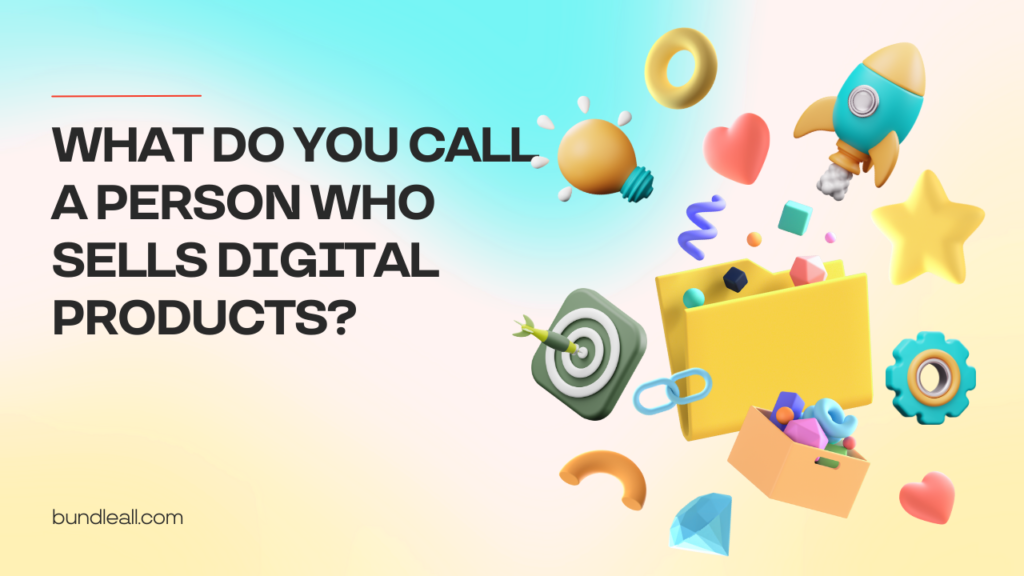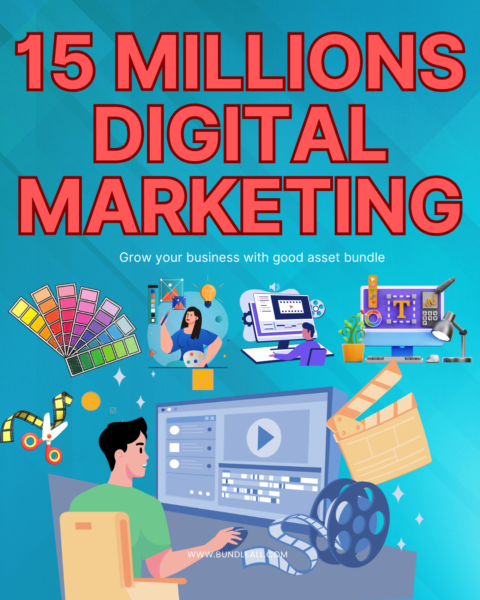
What Do You Call a Person Who Sells Digital Products?
Introduction
The digital landscape has opened up a world of opportunities for entrepreneurs and creators alike. With the growing popularity of digital products—items that can be downloaded or accessed online—the market has become a playground for innovation and profit. But what do you call someone who is at the forefront of this digital revolution? Whether you’re an aspiring digital product seller or simply curious about this emerging field, understanding the various roles and titles associated with selling digital products is crucial.
Understanding Digital Products
What Qualifies as a Digital Product?
Digital products are intangible items that exist solely in the digital realm. Unlike physical goods, they do not require inventory, shipping, or physical storage. Examples include ebooks, software, online courses, graphics, music, and more. Essentially, anything that can be delivered electronically falls under the category of a digital product.
Examples of Digital Products
- Ebooks: Digital versions of books that can be read on electronic devices.
- Software: Applications or programs that are distributed digitally.
- Online Courses: Educational content delivered via the internet.
- Digital Art: Graphics, illustrations, and other visual media available for download.
- Music and Audio Files: Songs, podcasts, and audiobooks in digital format.
The Advantages of Selling Digital Products
Selling digital products comes with a myriad of benefits. These products typically have lower overhead costs since there’s no need for physical materials or shipping. They can also be sold globally, reaching a much wider audience. Additionally, digital products can be sold repeatedly without the need for restocking, making them a scalable source of income.
Who Is a Digital Product Seller?
Different Titles for Digital Product Sellers
The world of digital product selling is diverse, and so are the titles associated with it. Depending on the type of products being sold and the platform used, a digital product seller may be referred to by various names. Some common titles include Digital Entrepreneur, Infopreneur, eCommerce Seller, and Content Creator.
Roles and Responsibilities
A digital product seller is responsible for creating, marketing, and selling digital goods. This involves everything from product development and pricing strategies to customer service and technical support. The goal is to create products that meet the needs of a specific audience while also generating profit.
Skills Required to Be Successful
To thrive as a digital product seller, one must possess a combination of technical skills, marketing acumen, and customer service expertise. Understanding how to create high-quality digital products is just the beginning; knowing how to market them effectively and provide excellent customer support is equally important.
Common Titles for Digital Product Sellers
Digital Entrepreneur
Definition and Overview
A Digital Entrepreneur is someone who leverages the internet to create and sell digital products. This term is often used to describe individuals who build online businesses centered around digital goods. Digital Entrepreneurs are typically involved in every aspect of their business, from product creation to marketing and sales.
How Digital Entrepreneurs Operate
Digital Entrepreneurs often operate online businesses that are entirely digital. They use websites, social media, and other online platforms to reach their target audience. They may sell their products directly through their website or use third-party platforms like Amazon, Etsy, or Gumroad.
Success Stories of Digital Entrepreneurs
Many successful Digital Entrepreneurs have made a name for themselves by selling digital products. For example, Pat Flynn, the founder of Smart Passive Income, has built a multi-million dollar business by selling online courses, ebooks, and other digital products. Similarly, Marie Forleo, the creator of B-School, has become a leading figure in online education.
Infopreneur
What is an Infopreneur?
An Infopreneur is someone who sells information-based products. These individuals typically create and sell digital products like ebooks, online courses, and webinars. The term “Infopreneur” is a combination of “information” and “entrepreneur,” reflecting their focus on monetizing knowledge.
Key Differences Between Infopreneurs and Other Sellers
Unlike traditional sellers who may offer physical goods, Infopreneurs focus exclusively on selling information. Their products are designed to educate, inform, or entertain their audience. This niche requires a deep understanding of the subject matter and the ability to present it in a way that is accessible and engaging.
Popular Platforms for Infopreneurs
Infopreneurs often use platforms like Udemy, Teachable, and Thinkific to sell their digital products. These platforms provide the tools needed to create and market online courses, webinars, and other informational products.
eCommerce Seller
The Role of an eCommerce Seller
An eCommerce Seller is someone who sells products online, whether physical or digital. In the context of digital products, an eCommerce Seller may offer anything from software to digital art. They typically use eCommerce platforms like Shopify, WooCommerce, or BigCommerce to set up their online stores.
Digital Products vs. Physical Products in eCommerce
While physical products require inventory management, shipping, and handling, digital products are delivered electronically. This eliminates many of the logistical challenges associated with physical goods, making digital products an attractive option for eCommerce sellers.
Top eCommerce Platforms for Selling Digital Products
Popular eCommerce platforms for selling digital products include Shopify, which offers a seamless experience for setting up an online store, and Gumroad, which is specifically designed for creators selling digital goods.
Content Creator
How Content Creators Sell Digital Products
Content Creators are individuals who produce original content, such as videos, blogs, and podcasts. Many Content Creators monetize their work by selling digital products related to their content, such as ebooks, printables, or premium content.
The Importance of Branding and Audience Engagement
For Content Creators, building a strong brand and engaging with their audience is crucial. A loyal audience is more likely to purchase digital products, especially when they perceive value in the content being offered.
Monetizing Digital Content
Content Creators can monetize their digital content in various ways. This may include selling products directly, offering subscriptions to premium content, or partnering with brands for sponsored content.
Skills Required for Selling Digital Products
Technical Skills
Selling digital products often requires a solid understanding of various technical aspects, such as website design, digital marketing, and product creation software. Being tech-savvy can significantly streamline the process of selling digital goods.
Marketing and Sales Skills
Effective marketing is key to the success of any digital product. Sellers need to be adept at creating compelling marketing campaigns, utilizing SEO, and understanding their target audience. Sales skills, including the ability to close deals and upsell products, are equally important.
Customer Service and Support
Providing excellent customer service is essential for retaining customers and building a positive reputation. This includes offering timely support, handling refunds, and addressing customer concerns.
Strategies for Success in Selling Digital Products
Building a Strong Online Presence
A strong online presence is critical for selling digital products. This includes having a well-designed website, active social media profiles, and a clear brand identity. Consistency in branding and messaging helps build trust with potential customers.
Utilizing Social Media and Online Communities
Social media platforms and online communities are powerful tools for reaching potential customers. By engaging with these communities and sharing valuable content, sellers can build a following and drive traffic to their products.
Leveraging SEO and Content Marketing
SEO and content marketing are essential for driving organic traffic to your digital products. By optimizing your website and content for search engines, you can attract more visitors and increase sales.
Challenges in Selling Digital Products
Competition in the Digital Marketplace
The digital marketplace is highly competitive, with many sellers vying for attention. Standing out requires offering unique products, exceptional customer service, and effective marketing strategies.
Protecting Intellectual Property
One of the challenges of selling digital products is protecting your intellectual property. Digital products are susceptible to piracy and unauthorized distribution. Sellers must take steps to secure their products, such as using digital rights management (DRM) tools.
Managing Customer Expectations
Customer expectations can be high when it comes to digital products. Sellers need to ensure their products meet these expectations and offer clear communication and support to address any issues that arise.
The Future of Digital Product Selling
Trends Shaping the Future of Digital Products
The future of digital product selling is likely to be shaped by several key trends, including the rise of subscription-based models, the increasing use of AI and automation, and the growing importance of personalization in digital products.
The Role of AI and Automation
AI and automation are expected to play a significant role in the future of digital product selling. These technologies can help streamline processes, from product creation to customer support, making it easier for sellers to scale their businesses.
Predictions for the Next Decade
Over the next decade, we can expect to see continued growth in the digital product market, with new opportunities emerging for sellers. As technology advances, the ways in which digital products are created, marketed, and sold will continue to evolve.
Conclusion
In conclusion, the world of digital product selling is vast and filled with opportunities. Whether you’re a Digital Entrepreneur, Infopreneur, eCommerce Seller, or Content Creator, there are many paths to success. By understanding the roles, responsibilities, and skills required to thrive in this field, you can carve out your own niche and build a successful digital product business.
FAQs
What is the most profitable digital product to sell?
The most profitable digital product to sell often depends on your niche and target audience. However, online courses, software, and ebooks tend to be highly profitable due to their scalability and low production costs.
How can I start selling digital products online?
To start selling digital products online, you’ll need to choose a product to sell, create or source the product, set up an online store or use a platform like Shopify or Gumroad, and market your product to your target audience.
Is it difficult to protect digital products from piracy?
Protecting digital products from piracy can be challenging, but there are tools available, such as digital rights management (DRM) and watermarks, that can help secure your products.
What are the best platforms for selling digital products?
Some of the best platforms for selling digital products include Shopify, Gumroad, Etsy, and Teachable. The right platform for you will depend on your specific needs and the type of products you’re selling.
How do I market my digital products effectively?
Effective marketing for digital products involves a combination of SEO, content marketing, social media engagement, and email marketing. Building a strong brand and engaging with your audience are also key factors in successful digital product marketing.
-
Sale!

500+ CANVA TEMPLATES PLANNER BUNDLE
Add to cart$ 19,99Original price was: $ 19,99.$ 5,00Current price is: $ 5,00. -
Sale!

15 Millions Digital Products
Add to cart$ 19,99Original price was: $ 19,99.$ 10,00Current price is: $ 10,00. -
Sale!

400k Digital Products Library
Add to cart$ 19,99Original price was: $ 19,99.$ 5,00Current price is: $ 5,00. -
Sale!

15 MILLION DIGITAL PRODUCTS PLR Bundle
Add to cart$ 19,99Original price was: $ 19,99.$ 5,00Current price is: $ 5,00. -
Sale!

20k Canva Templates
Add to cart$ 10,00Original price was: $ 10,00.$ 1,00Current price is: $ 1,00. -
Sale!

Social Media Traffic Avalanche
Add to cart$ 9,99Original price was: $ 9,99.$ 1,00Current price is: $ 1,00.